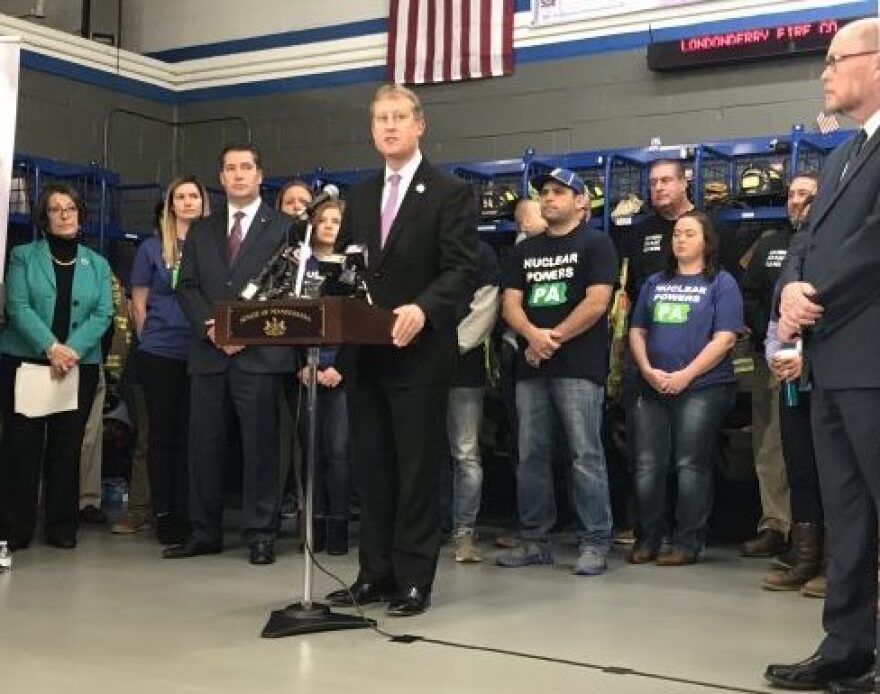KEYSTONE CROSSROADS - State Rep. Curt Sonney hails from just outside Erie representing an 'L'-shaped district jammed into the state's northwestern corner.
State Sen. Ryan Aument comes from the state's heartland, and represents a chunk of fast-growing Lancaster County.
But the two Republican lawmakers have something important in common: they will lead the education committees in their respective chambers this legislative session. Their appointments make them major players on an issue that tends to draw considerable attention in Harrisburg.
Aument, a fixture on House and Senate Education Committees since arriving in Harrisburg eight years ago, has personal and professional ties to education. He majored in the subject while in college at The Citadel, and his wife taught for years at the Milton Hershey School near Harrisburg.
As a freshman representative in 2011 he quickly identified education as a way to establish himself in Harrisburg.
"I recognized early on there was a real opportunity to have an influence and be really useful in the caucus," Aument said.
Within months of arriving in the capitol, Aument helped spearhead the creation of a statewide teacher evaluation law -- which, in part, uses student performance on standardized tests to determine a teacher's effectiveness.
Aument now says that system relies too heavily on exam scores and plans to work across the aisle to adjust that balance.
"There is a sense that the pendulum has swung too far and we need to do more to allow our educators, our school leaders, to be innovative, more creative, and to do what they do best," Aument said.
Aument was also a major backer of legislation that diminished teacher seniority rules and gave school districts more flexibility when it comes to layoffs. Governor Tom Wolf vetoed the bill initially, but allowed it to pass into law without his signature in 2017 as part of a larger package of education-related policies.
As committee chair, Aument says he wants to focus on legislation that has bipartisan support. He expects those bills to cover topics like career and technical education and funding for higher education.
He acknowledges, however, that old education debates are likely to reemerge this session.
He expects some of his Republican colleagues to reintroduce legislation on education savings accounts, which would set aside some taxpayer money for parents to use to pay private school tuition.
Although Republicans lost a potential ally when Democrats didn't reappoint school-choice-supporter Anthony Hardy Williams (D-Philadelphia) to the Senate Education Committee, Aument believes there will be enough conservative support to "elevate a conversation around those issues."
The state's two-decade-old charter law also inspires annual debate in Harrisburg, and Aument again expects the topic to surface. He says he favors "greater accountability and greater transparency of academic outcomes at our charter and cyber charter schools," which is the kind of rhetoric many can get behind. But when it comes to details, Aument admits it will be difficult to strike a balance that works for all sides.
Aument lists his other top priorities as "bolstering school safety, reducing dependence on property taxes for school funding, and tackling student loan debt."
Rep. Sonney says he wanted the chairmanship of the House Education Committee, but admits he'll have a lot of catching up to do since he hasn't served on the body since 2008.
"I personally am coming into this very open-minded," he said.
Sonney hasn't been a lead sponsor on many education-related bills in recent years. One exception: he has repeatedly introduced a measure that would require families to pay for their spot in a cyber charter school if their district offers an in-house cyber option.
A longtime member of the House Appropriations Committee, Sonney also helpedthe Erie City School District secure $14 million in extra state funding in 2017 after the superintendent threatened to shutter its high schools in the midst of a budget crisis.
School leaders in Erie have advocated for the state to run more money through the school funding formula enacted in 2016, which greatly benefits districts with high poverty, high tax effort and stable or growing enrollment.
The formula is designed to make education funding more predictable while, in theory, eliminating the need for emergency cash injections such as Erie received.
Sonney, though, disagrees that the formula should be implemented more rapidly, noting the ill-effects it would cause to many districts where population has plummeted. As of now, only increases to state funding since 2015-16 are distributed through the formula.
"The only thing the new funding formula does is make a different set of winners and losers," said Sonney. "That's all it does. That's why it has to be graduated in."
Like Aument, Sonney plans to prioritize legislation on career and technical education. He also wants to get into classrooms around the state and says he plans to visit the wealthiest and poorest districts to "see what the difference is."
On the Democratic side of the aisle, there were no changes in committee leadership. State Rep. James Roebuck (D-Philadelphia) remains the education committee's minority chair in the House and State Sen. Andrew Dinniman (D-Chester) will keep that role in the Senate.


